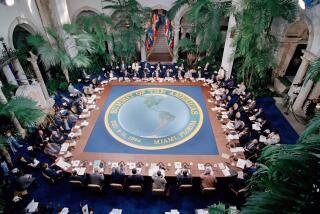Surprise !
- Share via
Just a few days ago the prospects for a U.S.-Soviet summit meeting, and for meaningful arms-control agreements, looked distinctly unpromising as a result of the Soviet arrest of American newsman Nicholas Daniloff. So the surprise announcement that President Reagan and Mikhail S. Gorbachev will meet in Iceland on Oct. 10 and 11 has to be seen as a positive step. The agreement to hold the “preparatory” meeting nonetheless raises some puzzling questions as to Soviet motives.
The official announcements in both Moscow and Washington said that the meeting this month was suggested by Gorbachev and accepted by Reagan. Both described the meeting as a preparatory step toward the follow-up summit in the United States that the two leaders agreed to in their first meeting in Geneva last November.
Actually, Gorbachev proposed a preparatory meeting with Reagan earlier this year, but the idea got a cool response in Washington, where it was viewed as part of the Soviet strategy to increase the pressure on Reagan for acceptance of the Soviet leader’s nuclear-test-ban proposal.
It isn’t hard to figure out why the idea looks more attractive to the Administration now; assuming that the meeting in Iceland goes at all well, Republican candidates may benefit in the Nov. 4 elections. But the Kremlin is not in the business of helping to elect Republicans.
There are several possible explanations for the Soviet renewal of the proposal for a pre-summit summit meeting. Not all are good news.
One is that the Soviets, having been stung by world reaction to the Daniloff arrest, which made Moscow look like the major obstacle to progress in arms control, are anxious to put the shoe on the other foot. Having released Daniloff, they now look forward to an Iceland summit in which they will repeat their calls for a nuclear-test-ban treaty and for long-term limits on Reagan’s Strategic Defense Initiative. If the American President is not accommodating, the Soviets can reasonably calculate that world opinion will swing against Reagan.
Another possibility is that Gorbachev, having loudly demanded the prospect of progress in arms control as a prerequisite for a summit, hopes to use the pre-summit summit to score some real or cosmetic gains that will make it politically acceptable for him to settle for less than a full loaf in advance of the previously agreed-on summit in the United States.
Still another possibility is that the two sides really are near agreement, but that both Gorbachev and Reagan feel that the preliminary meeting in Iceland is needed to energize the bureaucracies in both countries and to get the negotiations off dead center. Finally, it could well be that Gorbachev, for domestic political reasons or whatever, does not want to come to America just now and will use the Iceland meeting to make a case for canceling or postponing his summit visit to this country.
Not even the most knowledgeable U.S. experts on the Soviet Union really know the answer. Ten days from now we should begin to find out.
More to Read
Get the L.A. Times Politics newsletter
Deeply reported insights into legislation, politics and policy from Sacramento, Washington and beyond. In your inbox twice per week.
You may occasionally receive promotional content from the Los Angeles Times.










